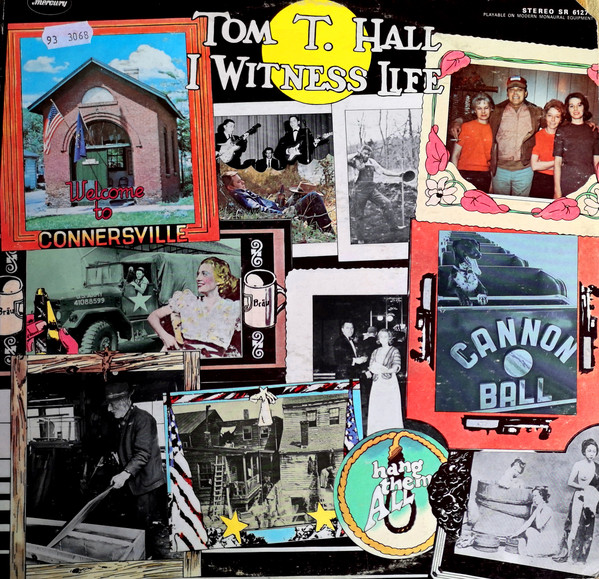
“Not necessarily an incident one would want to write Mother about.”
After years of writing songs for other people, Tom T. Hall launched his own career in 1969 with two albums containing four top ten singles. Never one to rest on his laurels (remember this dude routinely wrote six songs a day1), he followed up on his success by releasing two more albums in 1970. The first of the pair, I Witness Life, is a slightly less memorable affair than its immediate predecessor but still a very pleasant one. It contains a few of Hall’s signature story songs, a couple of sharp social critiques, and in between its filled in with those easy going, foot-stomping country jams that are a regular exercise for the songwriter.
The album lacks a story song as strong as either ‘(Margie’s at) The Lincoln Park Inn’ or ‘A Week in a Country Jail’ from Homecoming but still contains some lesser successes, most of which feel more like novelties than the poignant introspective musings that his best stories feature. ‘Salute to a Switchblade’, ‘Thank You, Connersville, Indiana’, and ‘Girls in Saigon City’ all appear to draw on first hand experience (perhaps with slight exaggeration), telling stories of Hall’s time in the Army and the beginnings of his music career just after getting out of it. ‘Salute’ was the album’s big single and it tells the story of a GI in Germany who mistakenly woos a married woman. In it, Hall includes several German phrases as he amusingly skirts death by switchblade.
Oh we must have drunk ten quarts of German beer.
My conscience and my sinuses were clear.
I asked that Fraulein if she was a spy she said nein but do bis ain bissel high
(A condition not uncommon to the American soldier).
‘Girls in Saigon City’ is a sad but lighthearted tale of an Army man who receives a Dear John letter from his wife while deployed in Vietnam and finds comfort in the arms of a prostitute in a place called Da Nang Village. It’s a minor effort, lyrically, but it’s composed and played really well by Mercury’s house band.
In two songs, Hall takes a political stance but does so with a wry smile. These are not really protest songs, per se, but rather observations about cultural attitudes and their effects. ‘Hang Them All’ is the more humorous of the two, suggesting that since we know there is a murderer, thief, cheater, and hypocrite in town, the most sensible solution is to hang everyone so as to ensure that those criminals are brought to justice. It ends with a warning that in such a system, the person calling for the hanging of others will also eventually be hanged themselves—an observation that is eerily relevant fifty years later. The other political song is ‘America the Ugly’, about a foreign photographer coming to visit the United States and capturing the residents of its seamy underbelly.
There were hopeless hungry living dead/Winos who sell their souls for a bottle of a cheapest red.
He went to the Appalachians and he saw what we all have seen/Where people live on bread and soup fat back and pinto beans.
He saw the hungry children and he photographed the ragged clothes/I guess we’re gonna try to tell him that it ain’t so.
Two other songs deserve a mention. ‘The Ballad of Bill Crump’ tells the true story of a lifelong woodworker named Bill Crump.2 He built the church, he built the pews, he built the cradles for the babies. He’s the reason God made wood. He likes woodworking so much that he even built his own coffin. The other song that stands out is the bluegrass-heavy ‘Chattanooga Dog’ which features Randy Scruggs (son of Earl Scruggs) on banjo. There’s a lively performance of it on Youtube that really I enjoy.
As a whole, the album doesn’t measure up to Hall’s best work, but it’s certainly not one to skip over as there are quite a few gems to be found.
Favorite Tracks: The Ballad of Bill Crump; Chattanooga Dog; Girls in Saigon City; Hang Them All; America the Ugly.
1. In recent times, Hall and his wife Dixie also won the “Bluegrass Songwriter of the Year” award twelve out of fourteen years from 2002-2015.
2. At this point in his career, Tom T. Hall had begun adapting other people’s tales into song form, so I don’t know if he actually knew Bill Crump at all or if he heard the story from someone else. I found a video of a man and woman from Crump’s neck of the woods where they tell a bit more about him and visit his grave.
Sources:
“The True Story Behind THE BALLAD OF BILL CRUMP”. Youtube, Queen Bee Zamagni. 23 March 2017.